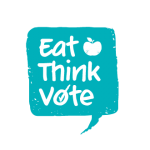Food Insecurity Report Demands Action, Say Food Movement Leaders
Posted: October 7, 2015
Categories: Food Access / GoodFoodBites / News from Sustain Members
 Community Food Centres Canada posted the following media release on Monday, October 5th. Thank you to CFCC for including the Eat Think Vote event co-hosted by Food Secure Canada’s youth caucus and Sustain Ontario. Good food advocates and families filled the room at Harbourfront Community Centre for a delicious meal provided by caterTO, Blackbird Bakery, and the Island Cafe. Thank you to Dr. Valerie Tarasuk and Spadina-Fort York candidates Adam Vaughan, Olivia Chow, Sharon Danley and Nick Lin for engaging in this important conversation about food insecurity and basic income.
Community Food Centres Canada posted the following media release on Monday, October 5th. Thank you to CFCC for including the Eat Think Vote event co-hosted by Food Secure Canada’s youth caucus and Sustain Ontario. Good food advocates and families filled the room at Harbourfront Community Centre for a delicious meal provided by caterTO, Blackbird Bakery, and the Island Cafe. Thank you to Dr. Valerie Tarasuk and Spadina-Fort York candidates Adam Vaughan, Olivia Chow, Sharon Danley and Nick Lin for engaging in this important conversation about food insecurity and basic income.
`Eat Think Vote` events press candidates to take action on hunger
Montreal; and Toronto, October 5, 2015 — Food Secure Canada and Community Food Centres Canada are reacting today with alarm to a new report on the persistently high rates of household food insecurity in Canada released by the PROOF research team. Household Food Insecurity in Canada 2013 has documented 2.4 million adults and nearly a million children in Canada– or approximately 12.5 per cent of households– experienced food insecurity in that year (the most recent year for which statistics have been compiled). The organizations say that this report is confirmation that political will is required to address this issue, as they are calling for all parties to do through their Eat Think Vote election campaign.
“This is a costly problem, in both human and financial terms, that can no longer be ignored by our politicians,” says Diana Bronson, Executive Director of Food Secure Canada. “Our Eat Think Vote campaign has seen over 50 grassroots events across the country asking local candidates to put poverty and food issues front and central in their platforms. The numbers in this report show that food insecurity is an intractable problem that requires a coherent policy response to address poverty head-on” says Bronson. […]
“Food insecurity is not only an affront to human dignity and rights but is also hugely costly to the public purse. Recent research done for Ontario clearly documented that higher household food insecurity results in significant health-care costs, with increases up to 121% for those living in severe food insecurity” says Nick Saul of Community Food Centres Canada. “If we extrapolate the Ontario figures nationally, a conservative estimate of the cost of food insecurity to the health care system is over $3 billion per year. As part of Eat Think Vote, Community Food Centres Canada is calling for all parties to investigate a basic income floor in order to combat hunger and food insecurity.”
Among other findings of the 2013 Report on Household Food Insecurity:
- the primary factor influencing food insecurity is income;
- 38.2% of single parent families headed by women were food insecure;
- 68% of households on social assistance were food insecure;
- Households with people of Aboriginal, Latin American or African descent experience significantly higher levels of food insecurity;
- the majority of food insecure households in Canada have some employment income;
- food insecurity is continuing to rise, with particularly alarming results in the Maritimes and Northern Canada.
Eat Think Vote is a campaign whose overarching goal is a comprehensive food policy that addresses the crisis of food insecurity– particularly but by no means exclusively in the North– as well as the economic, health and environmental issues related to food. Eat Think Vote events are planned from coast to coast and feature federal candidates and the pubic sharing a community meal and discussing the main issues connected to food insecurity in Canada.
Read the full media release in English and French and get contact information: http://cfccanada.ca/news/food-insecurity-report-demands-action-say-food-movement-leaders
One response to “Food Insecurity Report Demands Action, Say Food Movement Leaders”
Leave a Reply
You must be logged in to post a comment.

I hope that all who are involved with this critically important issue will realize that rising energy costs are forcing people to decide whether to ‘heat or eat’. The penalty for not paying a hydro bill is a very expensive fee for having your hydro reconnected when/if you can afford to pay the bill and the added penalty. I urge you to realize how energy costs are making food insecurity an issue for more and more people and this will only get worse in Ontario if we continue to waste money on industrial scale wind turbines.